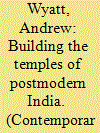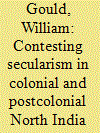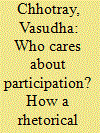| Srl | Item |
| 1 |
ID:
073689


|
|
|
|
|
| Publication |
2005.
|
| Summary/Abstract |
This article surveys the place of the economy in constructions of Indian national identity. The theme of physical construction in the literal and metaphorical building of the Indian national economy is explored. New iterations of this longstanding theme are located in an account of a new narrative of India's 'imagined economy'. The 'India Shining' political advertising campaign of 2004 is understood as an encapsulation of the new economic imaginary. The ongoing relevance of the substance of the India Shining campaign is demonstrated and linked to concerns to establish an India as an international brand. Changes in the Indian economy are linked to an account of the postmodern condition.
|
|
|
|
|
|
|
|
|
|
|
|
|
|
|
|
| 2 |
ID:
073690


|
|
|
|
|
| Publication |
2005.
|
| Summary/Abstract |
This article re-positions debates about the apparent 'crisis' of Indian secularism in relation to political events in the important phase of state transformation between the 1930s and 1950s. By looking at how the meaning of secularism was contested by political actors themselves in Uttar Pradesh, it argues that the ideological ambiguity of Indian secularism was the product of political debates and conflicts in these critical years. It suggests further that, in the decades spanning Indian independence, the real scope and limits of secularism within the polity were determined in local and provincial contexts, as much as on the national stage. In these years, political leaders attempted to define the relationship between religious tradition and 'scientific development' by reference to specifically Indian, as well as European philosophies, traditions and histories. In particular, the many Uttar Pradesh Congress visions of Indian secularism, represented by a palimpsest of ideological positions, could not have been exclusively shaped by an overarching modernist nationalist ideology (as many scholars suggest). Much more important was the need for political leaderships to manage a rapidly changing political context, and an unprecedented expansion of demand for state power and resources in the new Indian democracy.
|
|
|
|
|
|
|
|
|
|
|
|
|
|
|
|
| 3 |
ID:
073688


|
|
|
|
|
| Publication |
2005.
|
| Summary/Abstract |
This article responds to a recently made proposition that development policy does not drive practice but, instead, that practice produces policy, with key actors striving to maintain coherent representations of it. This proposition is used to examine the translation of the national policy for participatory Watershed Development in India into concrete procedures at the district level and, ultimately, the practices that follow to sustain them. While uncovering a definite chain of 'upward' representations in the relationship between practice and policy, this article discovers a striking disjuncture in the stakes of those who formulate the policy and all those who implement it, even in upholding a formal commitment to participation as the new authorised policy. This article demonstrates how participation actually works as a rhetorical state strategy in the face of widespread incredulity, with seriously impairing effects for equity as a policy objective.
|
|
|
|
|
|
|
|
|
|
|
|
|
|
|
|